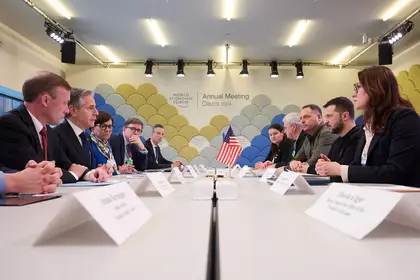With preparation for a Ukraine Peace Summit in June underway, concerns remain that the talks may lack strong participation from the Global South and from China in particular.
Next month, Switzerland will host a high-level international summit aimed at outlining a roadmap for future peace efforts in Ukraine, with 160 national delegations expected to be invited to the talks.
JOIN US ON TELEGRAM
Follow our coverage of the war on the @Kyivpost_official.
The Lucerne summit could gain diplomatic weight as G7 leaders, including US President Joe Biden, could jointly stop in Switzerland after their grouping’s gathering in Italy.
While Ukraine President Volodymyr Zelenskyy’s 10-point peace formula is expected to be the basis for the talks, the several other peace plans for Ukraine known so far are expected to play a role.
Ukraine’s blueprint envisages Russia withdrawing all of its troops from the country’s territory, the restoration of Ukraine’s territorial integrity, release of all prisoners of war and deportees, preventing ecocide in Ukraine, and punishing those responsible for war crimes.
Russia since then has repeated its minimum demands, which include demilitarisation and neutral status for Ukraine as well as the ceding of territory to Russia. For Kyiv, these conditions would amount to surrender.
Speaking about the goals of the summit, Zelenskyy said “Russia can only be forced to leave Ukraine alone” and will not leave by itself.

Latest on Russia’s Intransigence to End War Against Ukraine
“Putin does not want peace, he is insane, and every day his state does new things to prove it. And to overcome this evil, to overcome the war, we need the maximum unity of the world,” Zelenskyy said.
Russia will not be invited “at this stage” of the talks, the Swiss government said, though stressed that Moscow should be involved in the process “sooner or later.”
Ukrainian officials say Russians would only be allowed to take part in a follow-up summit, but according to Kyiv only to accept the Ukrainian conditions.
For Kyiv, direct peace negotiations would be another weapon of war, used to distract Western attention while pushing further on the battlefield.
Too big are the fears of a repeat of the Minsk agreements, negotiated under the auspices of France, Germany, and the OSCE to end the conflict in the Donbas region, which have long since become a byword for the West’s failure to deal with the post-2014 conflict in eastern Ukraine.
But Russia currently sees itself as being on the winning track militarily. With Moscow’s troops scoring small advances around the frontline in recent weeks, it doesn’t believe it has to negotiate.
For Sergey Radchenko, professor at the Johns Hopkins School of Advanced International Studies (SAIS), a solution remains far off, despite the efforts: “The Russians are clearly still hoping to win this war outright, while Ukraine is hoping that they will rally Western support and outlast Russia in the long-term.”
He is also sceptical of a summit going ahead without Russia.
“An eventual ceasefire agreement/peace treaty would have to involve Russia: there is no way around it because a negotiation that does not involve a key party is more of a solidarity exercise than a true negotiation,” Radchenko told Euractiv.
At the June talks, Ukraine and its Western allies want to rally broader international support for Kyiv, campaigning to persuade as many non-Western countries as possible to attend.
Diplomats involved in the preparations say there are fears the summit threatens to become a Western affair, without strong Global South participation.
While previous rounds of preparatory meetings managed to attract more non-Western states, it might be more difficult to secure the same when it comes to higher-level participation from those countries, they worry.
China, which experts say is unlikely to renounce support for Russia, has warned it won’t participate if Russia isn’t represented.
Further conditions for China to participate include confirmation that it will not amount to a full-blown summit so that they could send an envoy instead of a high-ranking politician, as well as their and other peace blueprints to be considered, people with knowledge of the discussion said.
“I do not think that the purpose – rallying the Global South and/or China – will be served particularly well by [not inviting Russia], as we already have witnessed from earlier gatherings, like in Malta,” Radchenko said.
From the perspective of Western diplomats, it is clear that if Beijing, Moscow’s most important ally, does not take part, the summit can hardly be a success.
That being said, EU officials are increasingly sceptical about the role Beijing can play in any future peace process.
With Chinese President Xi Jinping’s trip to Europe, they hope Beijing’s position on Russia’s war in Ukraine will be a key topic and Europeans will be able to convince Beijing it is in its interest to play a greater role in ending the Ukraine war.
French President Emmanuel Macron has said he will ask Xi to commit to that goal when he visits Paris, which is preparing to host the Olympic Games this summer.
It is customary where peace is expected to be upheld during the Olympics, but the 2008 Games in Beijing did not halt Russia’s August invasion of Georgia back then.
At the same time, Western officials fear the next few weeks might be marked by Russia making more tactical gains in eastern Ukraine, especially around the key June date.
A changed reality on the ground could change the dynamics of the talks, with increased pressure about the need to kickstart actual peace talks, they worry.
“A conference that actually aims to achieve a breakthrough would have to entail a protracted negotiation between a very limited number of parties,” Radchenko said.
“At the moment what we are seeing is a tendency towards a short PR event with a large number of parties, except the ones that matter,” he added.
You can also highlight the text and press Ctrl + Enter










